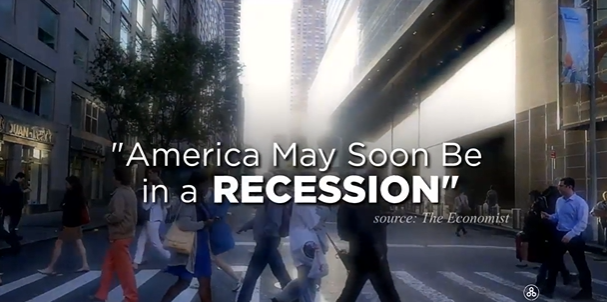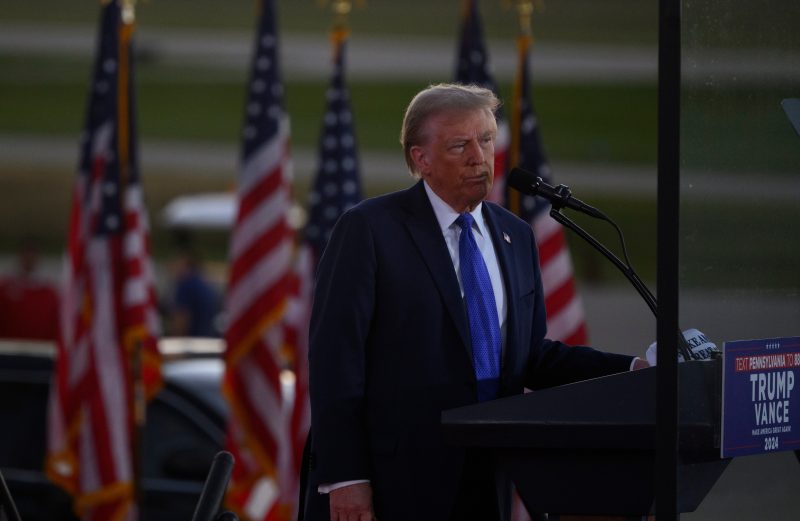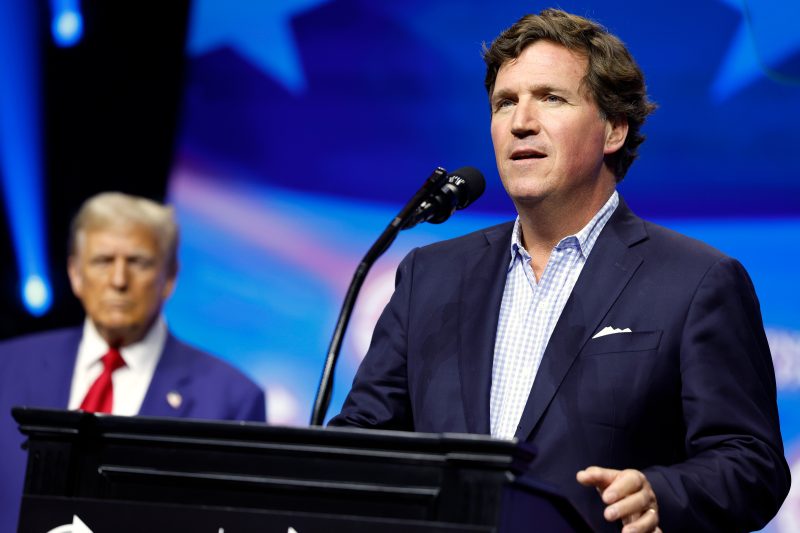
Trump campaign ad is stuck in an economic time warp
“Their ‘Bidenomics’ led to the highest inflation in 40 years. Highest gas prices ever. Skyrocketing interest rates. Unaffordable housing. Incomes down. Unemployment rising. And a recession now headed our way. Yet Kamala Harris is clueless.”
— Trump campaign ad, “Clueless,” released Sept. 23
On Sept. 18, the Federal Reserve Bank reduced interest rates by a half-percentage point, signaling that inflation had eased significantly. “This decision reflects our growing confidence that, with an appropriate recalibration of our policy stance, strength in the labor market can be maintained in a context of moderate growth and inflation moving sustainably down to 2 percent,” Fed Chair Jerome H. Powell told reporters.
Asked whether the U.S. economy faced the prospect of a recession, Powell said, “I don’t see anything in the economy right now that suggests that the likelihood of a recession, sorry, of a downturn is elevated. Okay? I don’t see that. You see growth at a solid rate, you see inflation coming down, and you see a labor market that’s still at very solid levels.”
The stock market soared to record highs after his remarks.
Five days later, with polls showing former president Donald Trump’s advantage over Vice President Kamala Harris on the economy narrowing, the Trump campaign released this ad. It’s a good example of how a campaign, faced with politically unwelcome economic news, relies on out-of-date numbers to make its case.
Let’s go through each of these points in order. The Trump campaign did not respond to a request for comment.
“Their ‘Bidenomics’ led to the highest inflation in 40 years.”
Inflation, as measured by the year-over-year percentage change in the consumer price index, spiked to a 9 percent annual rate in June 2022. That was the highest level in 43 years. But that was also two years ago. Inflation, as of August, has fallen to 2.53 percent. That’s similar to the inflation rate (2.49 percent) in January 2020, when Trump was president and before the pandemic.
Moreover, pinning the blame just on President Joe Biden and Harris is misplaced. Inflation initially rose because of pandemic-related shocks: increased consumer demand as the coronavirus pandemic eased, and an inability to meet this demand because of supply chain issues, as companies had reduced production when consumers hunkered down during the pandemic. Inflation climbed everywhere — with many peer countries doing worse than the United States — because of pandemic-related shocks that rippled across the globe.
An influential 2023 paper written by Olivier J. Blanchard, former chief economist of the International Monetary Fund, and Ben S. Bernanke, former chair of the Federal Reserve, pinned the blame for inflation on the pandemic. But they also concluded that inflation stayed high because of low interest rates and the impact of stimulus programs passed under both Trump and Biden that put dollars in people’s pockets and spurred some of that demand. Biden’s $1.9 trillion stimulus bill, passed in early 2021, might have especially fueled spending — as some economists, including Blanchard, warned at the time it would.
The final event that pushed inflation to 9 percent was Russia’s invasion of Ukraine in February 2022, which sent energy prices skyrocketing.
“Highest gas prices ever.”
The Russia-Ukraine war pushed gasoline prices higher — two years ago. What was once $5 a gallon gasoline is now closer to $3, depending on state and local taxes.
On an inflation-adjusted basis, gasoline prices were not the highest ever in 2022. Gasoline was more expensive in the early 2010s, 2008, 1981 and many years before World War II.
“Skyrocketing interest rates.”
The Federal Reserve, which is independent of the White House, boosted interest rates to combat inflation. The Fed Fund target rate was raised to as high as 5.5 percent, the highest since 1999-2000, when the Fed raised the rate to 6.5 percent over concerns that a frenzy in internet and technology stocks might spark inflation.
But, as noted, the Fed believes the program has been a success and is now reducing interest rates. It’s worth noting that Biden has never publicly complained about the Fed’s actions — and Harris has pledged to respect the Fed’s independence. Trump has made no such promise, and when he was president he criticized the Fed for “ridiculous policies.” He wanted rates kept low — which can be inflationary.
“Unaffordable housing.”
This line cites a New York Post article from June 2023 that references a spike in home mortgage rates because of the Fed’s actions. When the article was written, 30-year mortgage rates were 6.7 percent. They have now fallen to 6.08 percent, which is still the highest since 2008.
Housing affordability is an important issue, which is one reason Harris had proposed building 3 million new homes and offering up to $25,000 in down payment assistance for first-generation home buyers. Trump has promoted the deportation of millions of undocumented immigrants as a way to reduce competition for housing.
“Incomes down.”
The ad cites a Wall Street Journal article from 2023 on the Census Bureau reporting that household incomes had fallen for three straight years. (This included one year of Trump’s term, 2020, and the first two years of Biden’s term, 2021-2022.)
But on Sept. 10, two weeks before the ad was released, the Census Bureau reported that real median household income rose four percent in 2023, to $80,610, the first increase since 2019. The ad ignores this positive news and instead displays text: “Americans’ incomes down three straight years.” That leaves the misleading impression that the decline happened in all three years of Biden’s presidency.
“Unemployment rising.”
This line is especially rich. The unemployment rate in August was 4.2 percent — near historic lows. But it is up slightly from 3.4 percent in January 2023, which was the lowest unemployment rate in 70 years.
“And a recession now headed our way.”
The Trump campaign sees a recession on the horizon. As noted above, the Fed chairman thinks there is little risk of that, though of course it’s always possible. Most economists say the combination of fiscal and monetary policy has cooled inflation without causing a recession — the best possible outcome.
What’s the source cited for this line? Another old article, from last November, in the Economist magazine. The headline was: “America may soon be in recession, according to a famous rule. But is it right?”
The article provided a technical explanation of the Sahm rule, named after former Federal Reserve economist Claudia Sahm. The rule says a recession is likely if the unemployment rate, based on a three-month average, is a half percentage point above its lowest point over the past 12 months. But the article notes that the post-pandemic economy made the rule less relevant.
Sahm agrees. “A recession is not imminent, even though the Sahm rule is close to triggering,” she wrote in July.
“Bidenomics hits families with a $5,600 pay cut”
This text appears as the voice-over says Harris is clueless. This is another out-of-date figure that we have dissected before — in 2023. It depends on an analysis of weekly wage gains, adjusted for inflation. The problem with this metric is that weekly wages spiked in certain months during the pandemic — both because of stimulus payments and also because millions of low-wage workers lost their jobs, changing the mix of workers. Thus, using January 2021 as a starting point gives a misleading picture.
If the starting point is February 2020, before the pandemic tanked the economy, inflation-adjusted weekly wages and hourly wages both show modest income gains for Americans. Another metric — real disposable personal income per capita — shows a five percent increase in income though July.
The Pinocchio Test
This ad is stuck in the time warp. The Trump campaign may wish it was still running in 2022 and 2023, when the economic numbers were grimmer for Democrats. But that’s no excuse for pretending the situation has not improved significantly in the past year. Otherwise, the Federal Reserve would not be cutting interest rates.
Three Pinocchios
(About our rating scale)
Send us facts to check by filling out this form
Sign up for The Fact Checker weekly newsletter
The Fact Checker is a verified signatory to the International Fact-Checking Network code of principles



